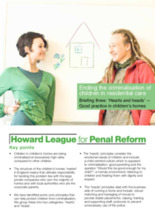

Displaying 1021 - 1030 of 1648
The objective of this study is to examine the intergenerational transmission of out-of-home care in Sweden.
This briefing paper is part of a series from the Howard League that explores some core principles to help protect children in residential care in the UK from criminalisation.
This article discusses caregivers’ and young people’s experiences of a novel approach to sibling contact, Siblings Forever, an event devised to overcome some of the tensions and frustrations in usual arrangements.
This article presents findings from research into how young people growing up in foster care in the UK manage the relationships in their social networks and gain access to social capital.
This study addresses the needs of Scottish kinship carers of teenage children who have been identified as being in need of extra support.
The study addresses the needs of Scottish kinship carers of teenage children who have been identified as being in need of extra support.
This study contributes to the development of understanding of empathy as a social work skill through a mixed‐methods analysis of 110 audio recordings of meetings in a child protection service between workers and parents, applying a coding framework for analysis.
The aim of the study was to examine how carers communicate with looked‐after young people about alcohol, tobacco, and drug use.
This systematic review aimed to establish the effectiveness of interventions with adoptive parents on adopted children and adolescents’ psychological well-being, behavioural functioning and parent–child relationship.
This article presents findings from a cross-national study exploring how social workers in child welfare conceptualise ‘family’, and how they relate to ‘family’ in their practice.

